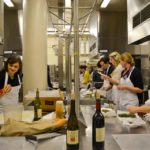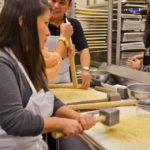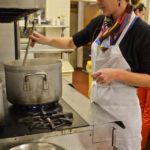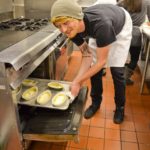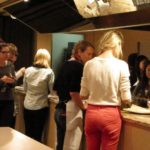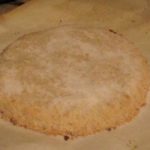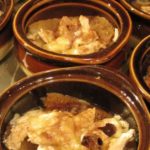April Food Events

We're entering the last full month of the spring semester, meaning final papers, projects, exams, and graduation are just around the corner. As you endeavor to create masterpieces of food studies scholarship, remember that taking a break to refresh can actually increase productivity. So, join us at some great food events this month, including BU Gastronomy events: Gardening Club on April 2, a working paper presentation by Dr. Catherine Womack on April 3, and a screening of The Garden on April 19.
SUNDAY, APRIL 1
Who Fishes Matters, Chat & Chowdah Benefit for NAMA: If you've ever wondered, "Who catches my fish?" this event and benefit aims to be equal parts informational and delicious. Reservations required; call (508) 641-0878. $20 covers salad and chowder.
2-4 pm, nourish grill and bar, 1727 Massachusetts Ave, Lexington, MA
MONDAY, APRIL 2
BU Gastronomy Gardening Club: Join us for this season's kick off meeting. No experience required!
5-6p pm, 808 Commonwealth Ave, Fuller Building, Room 109
TUESDAY, APRIL 3
The Food Project Individual Volunteering: Tuesday, April 3 is the first day of volunteering on The Food Project's farms at the locations and times below. Register here to get started.
- In Lincoln - Mondays, Wednesdays, and Saturdays from 9:30-12:30 pm
- In Boston - Tuesdays, Thursdays, and Saturdays from 9:30-12:30 pm
- In Lynn - Tuesdays, Thursdays, & Saturdays from 9:30-12:30 pm; Thursdays from 8-10 am
- In Beverly - Tuesdays and Thursdays from 9:30-12:30 pm; Saturdays from 9:45-12:30pm
BU Gastronomy Working Paper Presentation, Dr. Catherine Womack
 Join us for a working paper presentation titled "Eating Salad is Hard: A Look at the Phenomenology of Fast Food Consumption" with Dr. Catherine Womack, who teaches Philosophy of Food (ML 614).
Join us for a working paper presentation titled "Eating Salad is Hard: A Look at the Phenomenology of Fast Food Consumption" with Dr. Catherine Womack, who teaches Philosophy of Food (ML 614).
Selection from paper abstract: "In this paper, we use transcripts of 14 in-depth interviews conducted with student fast-food workers to identify some salient features underlying subjects’ experiences of fast food eating. We present results, discussing the features of satiety, satisfaction, feeling ill, as well as feelings of healthy eating. Greater knowledge about the content and concepts involved in unhealthy eating experiences can reveal new directions in food policy, nutrition education, and public health interventions."
5-5:45 pm, 808 Commonwealth Ave, Fuller Building, Room 109
Lobster: A Global History: As part of the Culinary Historians of Boston speaker series, Elizabeth Townsend, will present a talk on her book, Lobster: A Global History.
6 pm, Schlesinger Library, 10 Garden Street, Cambridge
THURSDAY, APRIL 5
Reign of Terroir in the Humanities, The Ideological Roots of Wine: "Long thought by geologists and environmental scientists as embodying a direct correlation between the natural and gustatory worlds, scholars in the humanities are now critical of terroir’s often nationalist, exclusionist, and protectionist discourse. By speaking across disciplines and national fields, we can reach an understanding of terroir that digs below its surface aesthetic, and begins to recognize the phenomenon’s deeper roots."
Speakers Rachel Black (Boston University Gastronomy) and Edward Korry (Johnson & Wales) will discuss terroir and the international wine trade.
5:30 pm, Brown University, Pembroke Hall 305, 172 Meeting Street, Providence, RI
MONDAY, APRIL 9
Cultivating Food Justice: Race, Class and Sustainability: This is the final lecture in the "Leaders in the Environmental Movement Lecture Series" sponsored by Northeastern University's Environmental Justice Research Collaborative. It will feature Julian Agyeman, Professor of Urban and Environmental Studies at Tufts University.
5:30-7 pm, 10 Behrakis Health Sciences, 30 Leon Street, Northeastern University
FRIDAY, APRIL 13
Food Movements Unite! with Eric Holt Gimenez: Starting with Eric Holt Gimenez, Executive Director of Food First/The Institute for Food and Development Policy, introducing his new book Food Movements Unite!, this event promises a vibrant discussion of food justice, sovereignty, movements, and politics. A panel discussion will follow, spanning the uprising of food movements and politics, from the global to local perspectives.
6-8 pm, The Austin East Room, Austin Hall, Harvard University. 1515 Massachusetts Ave, Cambridge MA 02138
THURSDAY, APRIL 19
BU Gastronomy and the Fenway Garden Society Film Screening of The Garden
 Join us for a screening of The Garden, which tells "the story of the country’s largest urban farm, backroom deals, land developers, green politics, money, poverty, power, and racial discord. The film explores and exposes the fault lines in American society and raises crucial and challenging questions about liberty, equality, and justice for the poorest and most vulnerable among us." This event is co-sponosored by BU Gastronomy (including Potter Palmer's A Survey of Food in Film class) and the Fenway Garden Society.
Join us for a screening of The Garden, which tells "the story of the country’s largest urban farm, backroom deals, land developers, green politics, money, poverty, power, and racial discord. The film explores and exposes the fault lines in American society and raises crucial and challenging questions about liberty, equality, and justice for the poorest and most vulnerable among us." This event is co-sponosored by BU Gastronomy (including Potter Palmer's A Survey of Food in Film class) and the Fenway Garden Society.
6 pm, CAS B36, 725 Commonwealth Ave
MONDAY, APRIL 23
Culinary Chemistry: (Chick)peas on Earth: Email Eliad Shmuel at eliad[at]mit.edu if you are interested in the science of food and would like to join him in presenting a chickpea seminar at the Cambridge Science Festival:
Have some fun with food in the Museum's new lunchtime science series! Bring your lunch and something for dipping as you chat with MIT hummus enthusiast Eliad Shmuel about the MIT Hummus Experience and the science behind chickpea creations.
12:00-1:00 pm, MIT Museum, 265 Massachusetts Avenue, Cambridge
TUESDAY, APRIL 24
Professor Darra Goldstein Lecture: Professor Darra Goldstein, Francis Christopher Oakley Third Century Professor of Russian at Williams College and founding editor of Gastronomica: The Journal of Food and Culture, will address the topic, "What We Talk about When We Talk about Food." Lecture sponsored by the NEH Distinguished Teaching Professorship.
7 pm, Boston University, School of Law, Barristers Hall, 765 Commonwealth Avenue, First Floor
SUNDAY, APRIL 29
Let's Talk About Sustainable Seafood: Another free event from the Museum of Science and Let's Talk About Food, this time featuring a crash course in "Seafood 101," offering a number of informed perspectives on threats to fish stocks and to marine ecosystems in the context of the New England economy. Admission is free, but register here.
7:00 pm, Museum of Science, 1 Science Park
Cooking a Sixteenth Century Meal Brings Food History to Life
by Emily Contois | photos by Katherine "KC" Hysmith and Rudolf Manabat
As students in Dr. Ken Albala's Survey of Food History class (ML 622), we were overjoyed that the Food and the City Conference brought him to Boston not only to deliver the conference keynote, but to allow us the opportunity to meet him in person and cook together a sixteenth century meal.
 From our course lectures, we had learned that throughout history, specific ingredients have served as markers of social class that exude distinction. The most prestigious ingredients were often rare, expensive, and fashionable among the upper class at a certain time in a particular place. Rarity, cost, and fashion were unstable factors, however, meaning that the symbolic potential of ingredients evolved over time. The existence and expansion of trade networks, and globalization more generally, also played a significant role in specific ingredients securing elite status, while others did not.
From our course lectures, we had learned that throughout history, specific ingredients have served as markers of social class that exude distinction. The most prestigious ingredients were often rare, expensive, and fashionable among the upper class at a certain time in a particular place. Rarity, cost, and fashion were unstable factors, however, meaning that the symbolic potential of ingredients evolved over time. The existence and expansion of trade networks, and globalization more generally, also played a significant role in specific ingredients securing elite status, while others did not.
Trends and fashion made certain ingredients signs of social distinction. The variables of rarity and cost influenced trends, which tended to occur in cyclical and reactionary patterns. Culinary fashions changed for a variety of reasons, among them political, economic, cultural, and even due to changes in weather and climate. Culinary fashion often changed as ingredients became more commonplace and inexpensive, thus increasing their accessibility for the middle and lower classes and diminishing their symbolic potential and power for the nobility. For instance, medieval cuisine was heavily spiced as a demonstration of wealth because spices were expensive at that time. By the sixteenth century, however, spices had become more affordable, and upper class cuisine used less spices, instead emphasizing simplicity. Baroque fashion in particular emphasized elegant simplicity, rather than ostentatious cuisine, which had been popular when spices were expensive.This was in contrast to middle class cooking in the sixteenth century, which was heavily spiced due to the new affordability and accessibility of spices.

In our cooking class with Ken, the recipe for Stewe Mutton from Proper Newe Book of Cookery exhibits this transition well, as it not only calls for several herbs, but also a variety of spices: “cloves, mace, peper, saffron, and lyte salt.” As we discussed, a recipe from the sixteenth century featuring such an amalgamation of spices was one meant for the middle class for whom these ingredients were newly affordable, rather than for the nobility among which this style of seasoning had fallen out of favor.
Gathering together in the kitchen to cook, and then taste, sixteenth century recipes brought what we had learned from lectures and readings to life. The upwardly mobile aspirations of the sixteenth century middle class danced on our tongues as we contemplated the evolving meaning of specific ingredients throughout history.
Emily is a current gastronomy student and graduate assistant, editing the Gastronomy at BU blog, January-August, 2012. Check out her research in food studies, nutrition, and public health on her blog, emilycontois.com.
Food News Round Up: Wrangling Action
by Emily Contois
 Welcome, gastronomes and cowboys alike, to this action-oriented (and alluringly alliterative) edition of Food News Round Up. Part of the news process is indeed passive — the pleasant and oft solitary experience of soaking up the news via paper or screen. But what is so key with food, is the desire to take the next step beyond the passive processes of perusing, reading, and contemplating to the impassioned action of politicking, organizing, and converging. So stick a fork in these delicious bites of news — and then wrangle some food action.
Welcome, gastronomes and cowboys alike, to this action-oriented (and alluringly alliterative) edition of Food News Round Up. Part of the news process is indeed passive — the pleasant and oft solitary experience of soaking up the news via paper or screen. But what is so key with food, is the desire to take the next step beyond the passive processes of perusing, reading, and contemplating to the impassioned action of politicking, organizing, and converging. So stick a fork in these delicious bites of news — and then wrangle some food action.
Peruse - and Politick - the Politics of Provisions
- Strawberry lovers rejoice: methyl iodide is off the market
- Utah governor signs bill, makes unauthorized video or photos of ag operations illegal
- Can it be more ethical to eat meat? Vote, read the arguments, and vote again
- Connecticut takes first step toward required genetically modified food labeling
Read - and Reason - Rousing Research Results
- Study finds using antibiotic animal feed creates super germs that can pass to humans
- New study finds strong link between honey bee die-offs and insecticide used on corn
- Study finds smelly foods lead to smaller bites and potential weight loss
Ogle - and Organize! - Organic Oddities
- Organic milk testing may be falling short of non-GM standards
- Is Walmart really going organic and local?
Contemplate - and Critique - if Calories Count
- Jane Brody explores the calorie evidence presented by Marion Nestle and Malden Nesheim in new book, Why Calories Count
- Mark Bittman asks, is a calorie a calorie?
- David Katz argues "cottage industry" questioning calories should be shut down
Digest - and Dive into - Food Desert Discussions
- There’s more to fixing food deserts than building grocery stores, quality matters
- Considering rural food deserts
- USDA food desert metrics may skew food access problem
Curl Up to - and Converge - Food Culture Conversations
- The talk continues, Andrew Friedman discusses the politics of cookbook collaboration
- Broadway play, “The Big Meal,” acts out family life over restaurant meals
- Fabio Parasecoli muses on The Hunger Games and the politics of food
- Eating at home: experts tackle leftovers, food waste, and consumer guilt
- Read an excerpt from Harvey Levenstein’s newest book, The Fear of Food
Emily is a current gastronomy student and graduate assistant, editing the Gastronomy at BU blog, January-August, 2012. Check out her research in food studies, nutrition, and public health on her blog, emilycontois.com.
Portrait of a Young Food Photographer
by Katherine "KC" Hysmith

There’s nothing better than food people. It's a sentiment that I share with our guest lecturer, food photographer Nina Gallant, from our food writing class. This idea is reinforced every week when I meet with my BU gastronomy peers, the food folks at places around Boston, our fabulous professors, and the affable and adorable Sheryl Julian. Each of these people helps create the wonderful food scene in and around the Greater Boston Area.
Sheryl introduced us to Nina Gallant and her photography at the beginning of the semester, and each week we eagerly awaited our “field trip” to visit her in person. A brisk walk from the Regina Pizzeria bus stop and down a darkly lit street lined by brick and glass warehouses led to Nina’s little studio. The hallways are painted a clean grey and her studio door was propped open invitingly. Inside the one room flat was a neat little galley kitchen, fresh white palette-like walls, and photography gear poised for the next shot. Nina’s friend and colleague Meridith Byrne was there helping style a photo shoot featuring passion fruit flavored baked goods (which she graciously shared with us later!).
Together they went over the finer points of food photography, styling, and working in the food scene. They gave us pointers and then threw us into the fray armed with a camera, a handful of vegetables, fruits, or other produce, and any props we could procure around her studio or in her extensively stocked prop closet. Did I mention that she has her linens organized by color? If my closet is any indication, I’m on the right track with this whole food photography gig (and yes I know it takes much more than an OCD armoire).
The experience, to say the least, was superb. Nina and Meridith interacted like sisters, dressed like trendsetters, and answered all of our questions with saintly patience. Some of the best food scene role models a girl could ask for.
Nina & Meridith’s Food Photography Pointers
Photography:
- Relate the hero (main food) to the smaller actors (supporting ingredients).
- Use a piece of white paper/foam core/cloth as a reflecting surface to create more light.
- Aim for light that comes from behind the subject, somewhere between 10 and 2 o’clock.
- Think in terms of the full story. What you want to accomplish?
- Recognize the current food photography trends and find which ones work with your style.
- Use a wide open aperture (like F8) to achieve the fashionable select focus trend.
- Look for repeating colors to help carry through a story line.
- Take your time, take lots of pictures. That’s the beauty of digital!
Styling:
- Textures can work together.
- Use props or smaller ingredients to cover up flaws (like sauce on top of a pie).
- Start small and think before you act.
- You can always add more, but you can’t necessarily take away.
Props:
- Use shallow bowls and dishes to see more of the food.
- Never underestimate the brilliance of white dishes.
- Small scale or tiny dishes help focus the shot.
KC is a Gastronomy student. All of the photos in this post are her beautiful handiwork. Follow her food adventures on her blog, The Young Austinian.
Alumna Profile: Sydney Oland
by Lucia Austria
When it comes to careers in food, Sydney Oland is a renaissance woman. All signs pointed to food after graduating from the University of Toronto with degrees in Studio Art and English. “Most of the art installations I was doing revolved around food.” It became a passion she knew she had to pursue.
 Before enrolling in the Gastronomy program at BU, Sydney took classes at The Cambridge Culinary School of Arts where she cultivated her interest in cooking. “I was looking to get more involved in food, to study food on a physical, interactive level.” Sydney then worked as an intern for the renowned recipe magazine, America’s Test Kitchen based in Brookline, MA. There, Sydney honed her recipe development and writing skills.
Before enrolling in the Gastronomy program at BU, Sydney took classes at The Cambridge Culinary School of Arts where she cultivated her interest in cooking. “I was looking to get more involved in food, to study food on a physical, interactive level.” Sydney then worked as an intern for the renowned recipe magazine, America’s Test Kitchen based in Brookline, MA. There, Sydney honed her recipe development and writing skills.
While at Boston University, Sydney focused her research on food history and gender. She presented a paper on the topic of gender dynamics in professional and domestic kitchens at the 2009 Association for the Study of Food and Society (ASFS) conference at Penn State. Her program thesis chronicled the once controversial but now forgotten oyster wars of the eastern United States that occurred between mid-19th to mid-20th century. “These wars were all over the newspapers for over 100 years! There were pirates and gunfights…really exciting stuff.”
After graduating in 2009, Sydney satiated her craving to learn more about food by working as a cheesemonger for Formaggio Kitchen in Cambridge, MA, and free-lancing as a food writer. She passed down her practical food knowledge to others as an instructor at Create A Cook in Newton, MA. She then moved on to work as a Product Development Chef for Nestle in Haverhill, MA. Sydney has since plunged into the sweet world of chocolate as a Chocolate Maker for Taza Chocolate, Somerville MA. She also has two reoccurring columns with “Serious Eats,” testing and writing delectable brunch and supper recipes, from scotch eggs to beer braised pork shanks. Follow Sydney on “Serious Eats” or her personal blog, “Eating Nose to Tail.”
Sydney is still tuned into food and academia. She’ll be presenting a paper at this year’s ASFS conference at NYU . “I’m looking at the television show 30 Rock and the main character Liz Lemon’s relationship with food and how that might reflect the relationship between modern women and food.”
Ready to get your hands dirty and D.I.T.?

by Aubree DuPlessis
“It’s about acting your way into a new way of thinking, not thinking your way into a new way of acting,” Rachel Greenberger, Director of Food Sol, an action-tank at Babson College, reminded us at last month’s Food and the City Conference. Flashes of Lorenz’s butterfly effect and quantum leaps come to mind as I reflect on her words and how one moment, sentence, or even shared experience can take us from a virtual state to a manifest state. From thought to action.
Naturally, as graduate students we spend a lot of time in a thinking state. However, wouldn’t it be nice to get outside the ivory tower once in a while? As the spirit of spring knocks at our door, I can’t help but wonder – what better way to get into an action state than by getting our hands dirty in the garden?
Whether motivated by economic reasons, city beautification, or dreams of an alternative food system, more and more people are growing their own food in what is often referred to as the D.I.Y or back to the land movement. Although this concept is nothing new, we urbanites face an interesting set of obstacles, especially when it comes to space. The lack of growing space may discourage some D.I.Y. folks from taking root, but Bostonians are resourceful and as a result, community garden participation around the city is at an all-time high.
 Community gardens are an excellent way to utilize limited city space, but with increased demand, we must also consider who has access to these green spaces. My work at Boston Natural Areas Network (BNAN) has illuminated the fact that although there are thousands of community garden plots, waitlists for up to a year are common. This reality makes me all the more grateful for our Gastronomy program’s privileged access to a plot at the Fenway Victory Gardens.
Community gardens are an excellent way to utilize limited city space, but with increased demand, we must also consider who has access to these green spaces. My work at Boston Natural Areas Network (BNAN) has illuminated the fact that although there are thousands of community garden plots, waitlists for up to a year are common. This reality makes me all the more grateful for our Gastronomy program’s privileged access to a plot at the Fenway Victory Gardens.
The Gastronomy Garden Club manifested out of the Summer 2011 Urban Agriculture course, and we started to make an impressive dent in the once-abandoned plot. As students, we theorize about issues of access and how we will improve the food system, but why wait until graduation to act on it? We have a unique opportunity to put our learning into practice right in our very own community.
The BU Gastronomy plot is roughly 30’x15,’ which is about 450 square feet and has potential to yield one ton or 2,000 pounds of produce. It’s fun to imagine all the possible ways we could enjoy 2,000 pounds of vine-ripened tomatoes, nutritious greens, and other culinary delights. Should we donate our produce to a local food pantry? Sell it at the BU Farmer’s Market? Or conduct an “Experiencing Food through the Senses” class amidst the fresh herbaceous aromas? The potential is ripe.
So let us remember: Non Satis Scire. To know is not enough. Join us on Monday, April 2, from 5-6p at 808 Commonwealth as we start making our garden a reality (no experience necessary!) Oh, and by the way, I’m over D.I.Y. - let’s D.I.T. (Do-It-Together).
Aubree is a Gastronomy student, the Produce to Pantries Intern at Boston Natural Areas Network, and a proud maker of an in-home vermicomposting system. She dreams of someday opening the lid to find the industrious worms taking a break - dressed in bow-ties and top hats, dancin’ like no one’s watching.
Food News Round Up
Today marks the beginning of the Spring Break holiday at Boston University, so we'll hope that at least some of you are reading this week's Food News Round Up from a white sandy beach somewhere. No matter where you are, may you enjoy chewing on this smattering of food news focusing on systems, conflicts, trends, and food culture fights, plus an oppositional look at urban gardening. Feel free to comment and discuss!
FOOD SYSTEM: Farmers, Seeds, and Water
- USDA’s ‘Know Your Farmer Know Your Food’ program aims to document local food system
- Seed Matters PhD fellowship focuses on organic and sustainable grain farming
- UN report farmers will need 19 percent more water by 2050 to meet increasing demand
FOOD CONFLICTS: Workers, Schools, and Chemicals
- Yes, there’s real orange juice in Fanta, but Coca-Cola squeezes Italian workers to get it
- Coca-Cola modifies caramel color to avoid cancer warning label
- ‘Pink slime’ refused by fast food companies, but is added to U.S. school lunches
- BU Professor finds alternate explanation for obesity, it's not calories, but chemicals
FOOD TRENDS: Meatless Meals, Pouches, and Crazies
- Trends and projections predict drop in US meat consumption
- More foods going to pouch packaging
- Crazy fast food photos: La McBaguette, Darth Vader Whopper, Bacon Milkshake, and more
- Fighting fiercely over Jewish recipes, preservation and renewal
- Fighting to get forgotten British foods on the table and in the supermarket
+ Urban Gardening: The Good and the Bad
- Urban Roots documentary shows Detroit urban gardening as vehicle of self-determination and empowerment
- Considering the dark side of urban farming; from abandoned goats to discarded roosters
Gastronomy Student Association Meets over Wine and Cheese
by Annu Ross
On Monday, February 26, the newly official Gastronomy Student Association met for its first, well, official event—a wine and cheese pairing in a private room at Eastern Standard.
 Molly Hopper, who heads up Eastern Standard’s cheese program, selected two cheeses from the Loire Valley of France, and Colleen Hein, who runs the restaurant’s wine program, paired a Burgundy Chardonnay with each cheese. The first plate arrived with a fresh goat’s milk cheese called Petit Billy, a reference to the town in which it is produced, as well as to the male goat. An apple and raisin compote and baguette slices accompanied the chevre. The Petit Billy was creamy and earthy with a nice tang. Colleen paired a 2009 Domaine de la Cadette Bourgogne Vézelay la Châtelaine Chardonnay with this first plate. The 100% Chardonnay, un-oaked Domaine de la Cadette is grown in limestone and clay soils close to Chablis. It was crisp and refreshing with a pleasant tartness and notes of citrus. The wine brought out some fruity notes in the cheese, for a bright and Springy pairing.
Molly Hopper, who heads up Eastern Standard’s cheese program, selected two cheeses from the Loire Valley of France, and Colleen Hein, who runs the restaurant’s wine program, paired a Burgundy Chardonnay with each cheese. The first plate arrived with a fresh goat’s milk cheese called Petit Billy, a reference to the town in which it is produced, as well as to the male goat. An apple and raisin compote and baguette slices accompanied the chevre. The Petit Billy was creamy and earthy with a nice tang. Colleen paired a 2009 Domaine de la Cadette Bourgogne Vézelay la Châtelaine Chardonnay with this first plate. The 100% Chardonnay, un-oaked Domaine de la Cadette is grown in limestone and clay soils close to Chablis. It was crisp and refreshing with a pleasant tartness and notes of citrus. The wine brought out some fruity notes in the cheese, for a bright and Springy pairing.
 The second pairing was a pungent Brie Fermier de Jouvence and a 2008 Benjamin Leroux, Auxey- Dresses Chardonnay. The cow’s milk brie is aged 6 weeks and thermalized, which is an alternative pasteurization process that results in a cheese that is as close to a raw milk cheese as we will get in the United States, due to FDA regulations. The brie’s bloomy rind imparted a strong, complexity of flavor with notes of white pepper, hay, garlic, and truffle. The Benjamin Leroux wine, also made with 100% Chardonnay grapes, was oaky and full bodied and made an excellent match for the intense flavor of the brie. The honey comb paired with the brie and Chardonnay completed the trifecta of flavor.
The second pairing was a pungent Brie Fermier de Jouvence and a 2008 Benjamin Leroux, Auxey- Dresses Chardonnay. The cow’s milk brie is aged 6 weeks and thermalized, which is an alternative pasteurization process that results in a cheese that is as close to a raw milk cheese as we will get in the United States, due to FDA regulations. The brie’s bloomy rind imparted a strong, complexity of flavor with notes of white pepper, hay, garlic, and truffle. The Benjamin Leroux wine, also made with 100% Chardonnay grapes, was oaky and full bodied and made an excellent match for the intense flavor of the brie. The honey comb paired with the brie and Chardonnay completed the trifecta of flavor.
Molly and Colleen were gracious and informed hosts who were eager to create this experience and share their knowledge with Gastronomy students. Molly gets all of Eastern Standard’s cheeses from Murray’s in New York and Formaggio Kitchen here, in Boston.
Following the delectable and enlightening tasting, students brainstormed future events and activities for the Gastronomy Student Association. Stay tuned for exciting lectures, gardening club, and more delicious tasting events—next up is a Syrah/Petit Syrah themed evening as part of the Fireside Chats series at The Fireplace on Saturday, March 31. The event is available to Gastronomy students at a special discounted rate of $25. To confirm a seat for this event, please contact Natalie Shmulik at natalie_shh[at]hotmail[dot]com.
Gastronomy Design Contest
 The Gastronomy program may be a relatively small one at Boston University, but our growing community is strong, and our students are passionate about food, cooking, culture, sustainability, and eating locally.
The Gastronomy program may be a relatively small one at Boston University, but our growing community is strong, and our students are passionate about food, cooking, culture, sustainability, and eating locally.
As a way to bring our group closer together, we've decided to launch a canvas tote bag design contest, just for Gastronomy students and alumni!
Here's how this will work:
- Students can submit as many designs as they like to lucia.austria[at]gmail[dot]com, until Tuesday, March 20, 2012.
- We'll select our favorites from the submissions, and then post them to this blog, where everyone will be able to vote for their favorite.
- Whichever designer gets the most votes will get his or her design printed on a canvas tote bag—and receive a free tote!
We’ll setup an online store through zazzle.com where you can decide on what size tote bag to purchase to show off your swag around campus. There’s no purchase deadline, and your bag will be sent directly to you. A portion of the proceeds for each bag will go toward Gastronomy Student Association events.
Here are the rules for submissions:
- BU has specified that we can use any design, as long as it doesn't make use of any Boston University logos. Feel free to be creative!
- Your design must include
- "BU Gastronomy” or
- “Gastronomy @ BU” or
- “Boston University Gastronomy”
File specifications:
- Resolution should be 150 pixels/inch (ppi)
- Color mode should be sRGB or RGB
- PNG preferred, JPG accepted
- Available space is 2375 x 2375 pixels, or 16 x 16 inches
Do you design better with a pencil than a mouse? No problem! Submissions of scanned artwork are accepted, just as long as the file follows these guidelines as best as possible. Entries up for vote will be converted to these exact specifications.
Good luck!
March Food Events

March has come in if not like a lion, perhaps like a large house cat, with a bit of snow and chilly winds. But don't let the unpredictable and often cold weather keep you from attending some of the food events planned this month—especially the guest lecture by Tracie McMillan on Thursday, March 29.
Click here to RSVP for the Tracie McMillan lecture, book sale, and signing.
SATURDAY, MARCH 10
Food on Film at the Museum of Science Presents American Meat: This new documentary chronicles America's grassroots revolution in sustainable meat production. A discussion follows the screening. The film screening is free, but you must register.
2:30 pm, Museum of Science, 1 Science Park
MONDAY, MARCH 12
Susanne E. Freidberg Speaks on Fresh: As part of the Culinary Historians of Boston speaker series, Susanne E. Freidberg wil present a talk on her book, Fresh, which explores the cultural history of freshness and food.
6 pm, Schlesinger Library, 10 Garden Street, Cambridge
MONDAY, MARCH 19
Pépin Lecture Series: Ancient Grains for the Modern Meal with Maria Speck. Award-winning cookbook author, food writer, culinary instructor, Maria Speck, will discuss the subtle flavors and rich textures of whole grains and how she uses them in her recipes. You will sample small dishes from her award-winning cookbook, and go home with your own copy. The lecture costs $25.00 and reservations are required.
6 pm, 808 Commonwealth Ave, Fuller Building, Demonstration Room
TUESDAY, MARCH 20
Queen of the Sun Film Screening: What are the bees telling us? Find out at this screening of the film, Queen of the Sun, an alternative view at the global bee crises, heralded as "the feel good advocacy film of the year" by Box Office Magazine.
6 pm, CAS 225
SATURDAY, MARCH 24
Blog Better Boston Conference: This one-day event offers specialized workshops for bloggers, by bloggers—including tips for increasing traffic, using social media, and perfecting food photography skills. Register by the early bird February 15 deadline for a fee discount.
TUESDAY, MARCH 27
Boston Tree Party, Growing Civic Fruit: The event features a cross-disciplinary discussion on the intersection of art, urban agriculture, and civic engagement, followed by a screening of the new Boston Tree Party short documentary film and apple cider reception.
7 pm, Room 110, School of Hospitality Administration, 928 Commonwealth Ave, Boston
THURSDAY, MARCH 29
Guest Lecture, Book Sale + Sign with Tracie McMillan
 Join us for a special guest lecture by Tracie McMillan, award-winning journalist and author of the newly published and highly acclaimed book, The American Way of Eating: Undercover at Walmart, Applebee's, Farm Fields and the Dinner Table.
Join us for a special guest lecture by Tracie McMillan, award-winning journalist and author of the newly published and highly acclaimed book, The American Way of Eating: Undercover at Walmart, Applebee's, Farm Fields and the Dinner Table.
As McMillan watched the debate about America’s meals unfold, one that urges us to pay food’s true cost—which is to say, pay more, she couldn't escape asking, "What if you can't afford $9 tomatoes?" And so she went undercover to find the answer. Please RSVP here.
6 pm, SHA Auditorium, 1st Floor, 928 Commonwealth Avenue
FRIDAY, MARCH 30
Food and Wine Trivia Night with Joyce Lock, Gastronomy Alumna: Test your foodie knowledge, have fun, and win prizes. Your enrollment includes a place at the game table on one of three teams, along with play-friendly edible treats and beverages. The event fee is $20 and you sign up for a team of your liking at registration.
6 pm, 808 Commonwealth Ave, Fuller Building, Demonstration Room
SATURDAY, MARCH 31
Gastronomy Student Association Event, Tasting at The Fireplace: Join us for a Syrah/Petit Syrah themed evening as part of the Fireside Chats series at The Fireplace. The event is available to Gastronomy students at a special discounted rate of $25. To confirm a seat for this event, please contact Natalie Shmulik at natalie_shh[at]hotmail[dot]com.



